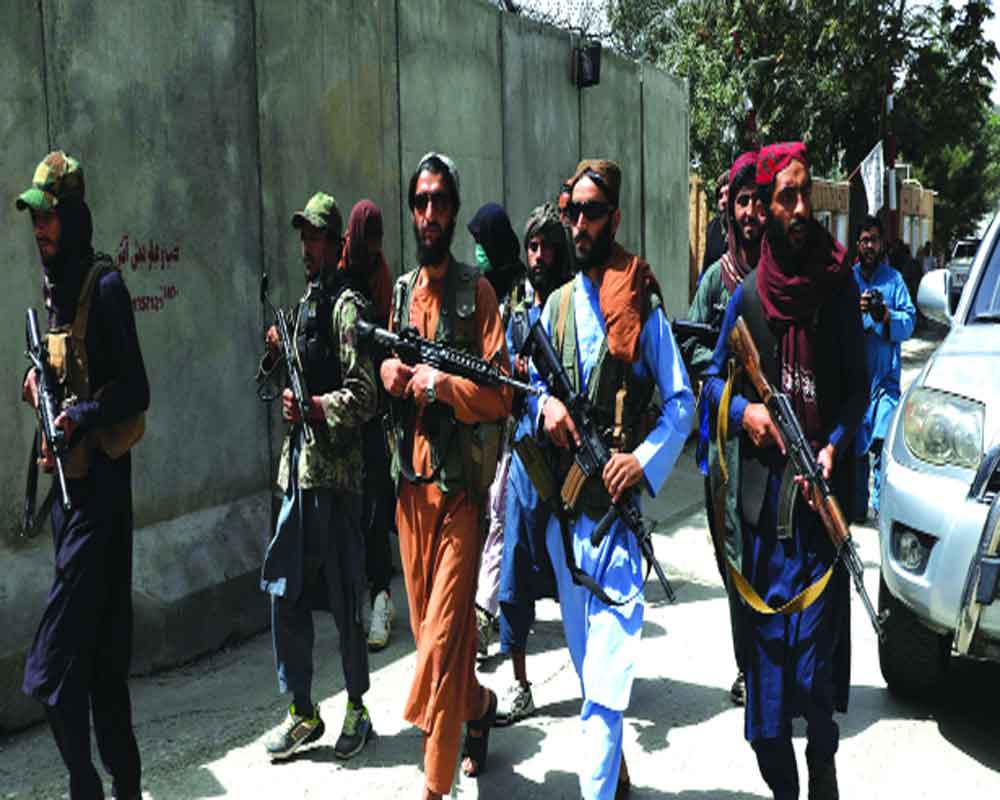The Taliban’s stated wish to have peaceful relations abroad notwithstanding, the global consequences of competitive militancy are dangerously severe
Will Afghanistan again become an exporter of global terrorism? My answer, an emphatic “yesâ€, will trigger sharp protests. Many perhaps will cite some of what Zabiullah Mujahid, Deputy Minister for Culture and Information and official central spokesman of the Islamic Emirate of Afghanistan (henceforth Islamic Emirate), said at the Taliban’s first official press conference in Kabul on August 17, 2021. The Taliban, he said, wished to have peaceful relations with other countries and no group would be allowed to use Afghan territory to attack other nations.
These were reassuring words. The Taliban, however, are not celebrated for matching their pronouncements with action when it does not suit them. Among other things, Mujahid also said at the same press conference that the rights of women would be protected within the framework of Islam. The same day, the Taliban announced a “general amnesty†for all officials of the ousted Government. “You should restart your routine life with full confidence,†said Enamullah Samangani, currently deputy central spokesman of the Islamic Emirate and a member of the Taliban’s cultural commission, who announced the amnesty. He also stated: “The Islamic Emirate doesn’t want women to be victims. They should be in the Government structure according to Shariah law.â€
The reality has been very different. Many former Government officials, including those who had surrendered, have been arrested/abducted, tortured and killed. Women have been effectively barred from education and employment, with only those whose services cannot be dispensed with, being allowed to work. They have to cover themselves head to foot in burqa, and be accompanied by a close male relative when venturing out of their homes. Music has effectively disappeared from Afghan life; the media are under increasing intimidation and pressure. By all indications, the Taliban, in their second coming, are set to unleash on Afghanistan the living hell they did during their first innings in power (1996-2001).
Will it be any different in the case of terrorism? According to a recent report by the Analytical Support and Sanctions Monitoring Team of the UN Security Council, the current Taliban regime provides safe haven to several terrorist groups. The Jaish-e-Mohammad (JeM) runs eight training camps in Nangarhar province, “three of which are directly under Taliban controlâ€. The Lashkar-e-Toiba (LeT) was “said to maintain three camps in Kunar and Nangarhar†provinces. Both groups have deep links with the ruling regime and hold meetings with people at the top level.
The UN report further states that Al-Qaeda in the Indian Subcontinent (AQIS) has between 180 and 400 fighters including “nationals from Bangladesh, India, Myanmar and Pakistan… located in Ghazni, Helmand, Kandahar, Nimruz, Paktika and Zabul Provincesâ€. Besides, the rechristening of its magazine from Nawa-i-Afghan Jihad to Nawa-e-Gazwah-e-Hind represents a shift in focus “from Afghanistan to Kashmirâ€. The largest terrorist group, however, is the Tehreek-e-Taliban Pakistan, which has an estimated strength of 3,000 to 4,000, mainly concentrated in the country’s eastern and south-eastern parts bordering Pakistan.
The UN report states that AQIS is “unlikely to mount direct attacks outside Afghanistan for the next year or two, owing to both a lack of capability and Taliban restraintâ€. But what happens after that? Also, what about the JeM and LeT? The argument that these outfits are likely to attack only India, implies the outrageous assumption that terrorism against India is permissible, but not against the US and the West. Besides, given their fundamentalist ideological orientation, there is no reason for them not to strike against the West, as the Al-Qaeda staged 9/11 and other attacks against the US, including the ones on the latter’s embassies in Nairobi and Dar-es-Salaam on August 7, 1998, which killed 224 persons and injured over 4,500.
Besides, there is the Islamic State of Khorasan Province (ISKP), an affiliate of the Islamic State of Iraq and Syria (ISIS), which is bitterly hostile to the Taliban. Contrary to the Taliban’s claims, it has not been crushed. A dispatch in The New York Times (datelined May 1, 2022) titled ‘With Spate of Attacks, ISIS Begins Bloody New Chapter in Afghanistan’, Christina Goldbaum states that since the Taliban seized power, the ISKP has grown in reach and expanded to nearly all of Afghanistan’s 34 provinces. She further cites Abdul Sayed, a security expert who tracks the ISKP and other jihadi groups, as saying that the ISKP carried out 119 attacks in Afghanistan in the last four months of 2021 against 39 in the corresponding period of 2020.
The UN report states that groups like the ISKP have declined in strength and are believed to be incapable “of mounting international attacks before 2023 at the earliestâ€. But what happens after that? Also, what about the Taliban themselves? Their soldiers regard the western countries, the Shia, Hazaras and all not practising their brand of Islam as enemies, having been fighting them continuously for years. They are bound to find peace boring. If the Taliban’s leaders do not sanction jihad abroad, they will gravitate to the ISKP. Indeed, one can foresee the rise of competitive militancy, with the inevitable consequence of attacks abroad as terrorist groups seek to retain/attract recruits.
(The author is Consulting Editor, The Pioneer. The views expressed are personal.)


























